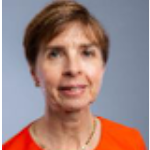Digital mental health – COVID-19 stories
Since the start of the COVID-19 outbreak, mental health services have worked hard to ensure that people can continue to get the care they need. Professionals and service users have worked together to ensure that services not only remain open but are also finding ways to make care more personalised, accessible and engaging. Here we hear from four inspirational people who have helped make this transformation happen.
Beth Lawton, Chief Digital and Information Officer, Sussex Partnership Foundation Trust
 Rapid rollout of video consultations
Rapid rollout of video consultations
The last few difficult months have shown the NHS and care services at their best. At Sussex Partnership Foundation Trust, I’ve been proud to work with our clinicians and digital experts to find ways to help people with mental health needs and learning disabilities continue to feel safe, supported and cared for. We developed the capacity to hold 15,000 online consultations in three months, showing what ambitious partnership working can achieve.
Sophie Roberts, Consultant Child and Adolescent Psychiatrist, Leeds and York Partnership Trust
 Supporting deaf children through the pandemic
Supporting deaf children through the pandemic
We knew that our deaf young patients would be finding lockdown really hard, with lack of access to information and communication. Although we could not continue face to face contact, we quickly set up digital platforms to continue to offer initial assessments and interventions though video. The young people we work with have made this easy for us and our deaf staff have led the way to reduce isolation and be able to continue to offer mental health support.
Alex Christie, Nurse, Basingstoke CYPMH (CAMHS) team
 I’ve been stunned at how some users of our service have been willing and able to move to digital provision of therapy. When every day involves discussing difficult and painful subjects, it’s perhaps possible to get desensitised to how hard it can be for many young people to have the conversations we offer them. It has been welcomed by several of my regular clients – especially those with neurodiversity. There are challenges both technically and clinically, but it’s an additional tool that we are keen to continue using together.
I’ve been stunned at how some users of our service have been willing and able to move to digital provision of therapy. When every day involves discussing difficult and painful subjects, it’s perhaps possible to get desensitised to how hard it can be for many young people to have the conversations we offer them. It has been welcomed by several of my regular clients – especially those with neurodiversity. There are challenges both technically and clinically, but it’s an additional tool that we are keen to continue using together.
Cheryl Barnes, Physical Health Specialist, Southern Health, West Early Intervention in PsychosisTeam
 I knew that my patients would want to continue working out through COVID-19, therefore I moved all my sessions to online. I got permission to set up a YouTube Channel to provide home workouts for patients and staff, set up 1:1 personal training and coaching and worked with local GPs and community mental health teams to provide physical health observations and monitoring remotely where possible.
I knew that my patients would want to continue working out through COVID-19, therefore I moved all my sessions to online. I got permission to set up a YouTube Channel to provide home workouts for patients and staff, set up 1:1 personal training and coaching and worked with local GPs and community mental health teams to provide physical health observations and monitoring remotely where possible.
I work with some incredible people who have put so much faith and hard work into their health and wellbeing, I felt it only right to adapt my approach to enable them to continue to grow and have ownership over their journey.
